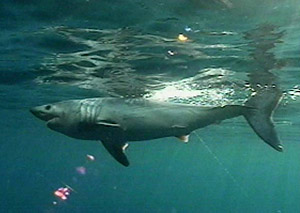 |
| Dr. Jeffrey Hutchings is the Canada Research Chair in Marine Conservation and Biodiversity at Dalhousie University.(Danny Abriel photo) |
Since the federal Species at Risk Act was passed in 2002, not a single marine fish has been added to the legal list of species at risk.
The northern Atlantic cod, for example, was assessed by the Committee of the Status of Endangered Wildlife in Canada (COSEWIC) as endangered off Newfoundland and Labrador in 2003. But, despite a decline estimated at 99 per cent, Atlantic cod hasn’t been added to the list.
COSEWIC makes recommendations, but final decisions rest ultimately with the Minister of the Environment, who consults with the Minister of Fisheries and Oceans on aquatic species.
“From COSEWIC’s perspective, it’s not as though we can be frustrated by such decisions,” says Dr. Jeffrey Hutchings, the chair of COSEWIC. “We provide scientific advice and it’s not our place to criticize if that advice is not heeded.”
But as a scientist and Canada Research Chair in Marine Conservation and Biodiversity at Dalhousie University, Dr. Hutchings finds such decisions problematic. Marine fishes are not being added, he believes, primarily because of the perceived economic consequences of doing so.
“If we continue to not add marine fish to the legal list, I don’t think we’re sending the right signal to the international community about Canada’s commitment to conservation and the protection of marine biodiversity,” he says.
 |
| The numbers of the porbeagle shark have been depleted by 90 per cent since the 1960s. |
The case of the porbeagle, the only shark for which there is a directed harvest in Canada, is particularly troubling, since its numbers are so low (depleted by 90 per cent since the 1960s) and it takes so long to rebound.
“By the government’s own reckoning, only one or two fishers are economically dependent on porbeagle. Under a worst-case scenario, listing might have led to a loss of eight jobs and an economic reduction of two per cent to a single community,” according to a paper, Biases in Legal Listing under Canadian Endangered Species Legislation. The paper, published in Conservation Biology earlier this year, was co-written by Dr. Hutchings and scientists at Simon Fraser University, University of British Columbia, and Université de Sherbrooke.
The paper concludes: “We document here a pattern consistent with bias against marine and northern species in legal listing.”
